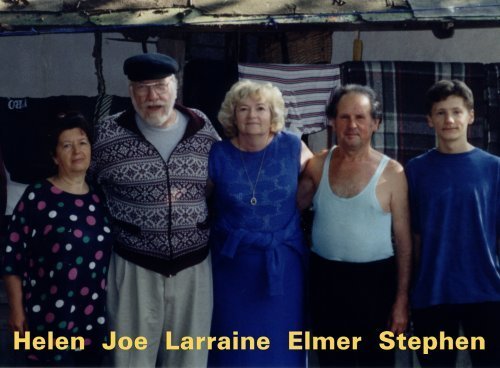The
Great Train Ride
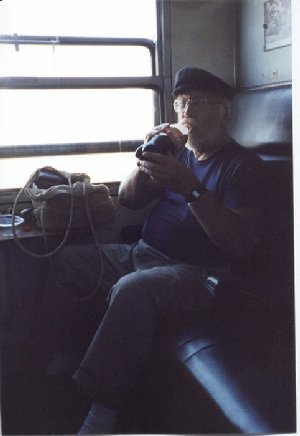
The
train to the Ukraine was scheduled to leave a 6:00 a.m. on Saturday. So I figured
that we should
be
looking for a cab about 4:00 in the morning.
Luckily, the cab driver that drove us home from the Consulate agreed
to pick us up in front of our apartment at this ungodly early hour.
I had a lot of trepidation
but true to his word the next morning at 4:30 he was waiting for us.
We
arrived shortly before 5:00 a.m. and boarded the train about a half-hour later.
The lights in the train were out and no one was on the train but us.
The train smelled from a strong detergent deodorant no doubt used to
cover the stench of the restroom facility in back of the car.
The cars there had a three-foot aisle on the left with seating compartments
on the right. Each compartment
had two facing seats, room for six normal sized people with luggage space over
head. Three people had to ride
backwards with two having window seats.
Being the first on the train we able to occupy the window seats.
Right
on time, at 6:10 a.m., the train pulled out of the station.
It left Budapest and headed for the countryside.
The scenery was simply gorgeous passing picturesque farmlands and pristine
villages. It made many stops and
at times got crowded with people left standing in the aisle with all seats occupied.
Unfortunately some of the people boarding the train were kind of chunky
and required more than their share of seat space.
The people are very friendly and quick to engage you in conversation.
Since the few words I knew in Hungarian had the right accent, they mistook
me for a native. When they spoke
to me their words flew pass my brain like bullets which caused me to just shake
my head in polite condescension which turned to dread when they stopped to await
my response. I had no idea what
they had said. When I pulled out
my dictionary from my back pocket I must have looked like a confused idiot.
Although the language is phonetic and easily read with the accent always on
the first syllable what it means is another thing.
It is a very difficult language to learn since it derives very little
from the familiar romance languages of French, German, Spanish and Latin.
It has its origins in the Urals of Asia far away from the influence of
these languages. 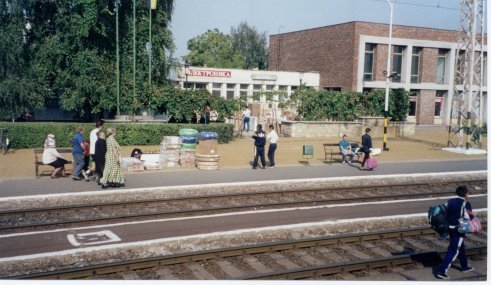
There were many stops and after each stop the conductor would ask for passports and tickets and then hastily stamp away, glancing suspiciously at the passenger before handing them back. The ride took six hours before it reached the border between Hungary and the Ukraine at which time the Ukrainian Police boarded the train complete with menacing side arms. The border looked like an armed camp, barbed wire every where and a lookout tower complete with gun toting guards. It looked different than the Berlin wall that had been knocked down between the two Germanys about a decade ago, in that it consisted of a ten-foot chain link fence complete with barbed wire on top setting on a berm. It looked like they were trying to prevent people from coming in and/or going out. About an hour went by before the police were satisfied and we slowly pulled across the border into Chop, the Ukrainian town across the border. There we were met by the border guards and escorted into the customís enclave. We were quickly separated from the rest of the people and shepherded into a corner of the building. According to the tourist guides that I have read, they would tear our luggage apart, search us and determine how much money we were carrying. But amazingly none of this happened. A tourist representative and a driver, as was prearranged, met us. The representative who spoke English and Ukrainian was welcome since the customs people did not speak English, Hungarian or German. He acted as an interpreter getting us through the customs swiftly without even a search of the luggage. We did however have to buy an inexpensive medical insurance policy. The only way into the Ukraine was by invitation from a tourist bureaucrat who issues the invitation and selects a driver and guide for you. The touring guides generally state that one is simply not allowed to visit relatives there except under supervision of a bureaucrat. If you insist on seeing them they were generally herded into a police station where a bureaucrat orchestrated the meeting. But we did not find this to be true. We had no more trouble entering the Ukraine than entering Hungary from the US.
The
Road to Mukancs
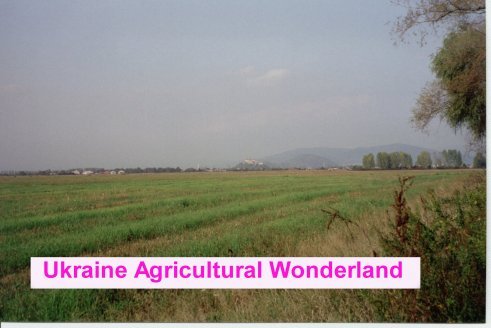 air seemed pure and caused me to involuntarily breathe deeper sucking in the
pure oxygen. It was about a two-hour
drive to Mukanc, a small city northeast of Chop.
All of the houses were lined up along the street, each with a grape arbor
and a garden in front. Huge
Concord grapes were growing on
the vines. Most of the grapes were
consumed locally since the Russians no longer had the rubles to purchase them.
On my arrival I noticed that the local transportation was either the
bicycle or the horse drawn wagons. Automobiles
were few but the ones we did see were newer models.
air seemed pure and caused me to involuntarily breathe deeper sucking in the
pure oxygen. It was about a two-hour
drive to Mukanc, a small city northeast of Chop.
All of the houses were lined up along the street, each with a grape arbor
and a garden in front. Huge
Concord grapes were growing on
the vines. Most of the grapes were
consumed locally since the Russians no longer had the rubles to purchase them.
On my arrival I noticed that the local transportation was either the
bicycle or the horse drawn wagons. Automobiles
were few but the ones we did see were newer models.
The
Plush Hotel Langer
We
were booked into the Langer Hotel in Mukanc.
The Alpine style hotel was very ornate and garish.
The view was simply breath taking.
It was located on the Latoryca river.
The river has green grassy riverbanks upon which many families were sitting,
running or walking. People were
playing with their dogs, and there was a cow and a goat eating the grass.
Some people were even swimming in the river.
Young men and 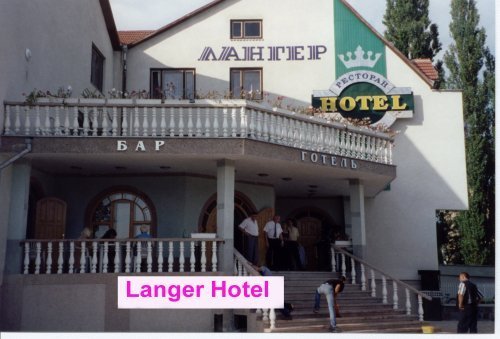 some boys were fishing using long old-fashioned fishing poles.
No one was catching fish though.
The hotel was recommended by the tourist agency as a quiet and peaceful
place. But unfortunately
on the day of our arrival a wedding reception was being held.
Since the cerebration lasted until six in the morning, it was difficult
to sleep with the loud music piercing the night air.
I can still hear that trumpet blasting away even though I am not there.
some boys were fishing using long old-fashioned fishing poles.
No one was catching fish though.
The hotel was recommended by the tourist agency as a quiet and peaceful
place. But unfortunately
on the day of our arrival a wedding reception was being held.
Since the cerebration lasted until six in the morning, it was difficult
to sleep with the loud music piercing the night air.
I can still hear that trumpet blasting away even though I am not there.
The
side streets in Mukanc were generally in good repair with a few potholes scattered
around here and there, but nevertheless very clean.
The hay wagons were plentiful filled with people going to church or later
for a Sunday drive.
Groups
of people with brooms and shovels were seen everywhere keeping the streets clean.
We were told that since the Russians moved out there wasnít much work
there and most of the work was the type provided under the Roosevelt administration
during the depression. They
had a television plant in Mukanc, which manufactured all of the televisions
for Russia and had employed many of the people there.
But it was closed down when the Russians left.
It was no wonder everyone we spoke to claimed to be 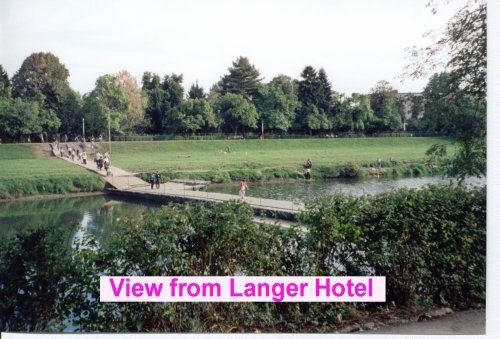 better off under the Communist rule. Going wages are about a hundred dollars
a month. Being close to the
border many of the natives there find work in Hungary which compared to the
Ukraine has a thriving economy. They
cross the border daily and apparently are not impeded since they bring in scarce
hard currency. Mostly Hungarians inhabited this area of the Ukraine. It was
partitioned after World War I and this part was considered a sop to be given
away for the sake of appeasement. It
finally ended up in the Ukraine after the breakup of the Russian Empire.
better off under the Communist rule. Going wages are about a hundred dollars
a month. Being close to the
border many of the natives there find work in Hungary which compared to the
Ukraine has a thriving economy. They
cross the border daily and apparently are not impeded since they bring in scarce
hard currency. Mostly Hungarians inhabited this area of the Ukraine. It was
partitioned after World War I and this part was considered a sop to be given
away for the sake of appeasement. It
finally ended up in the Ukraine after the breakup of the Russian Empire.
Janosi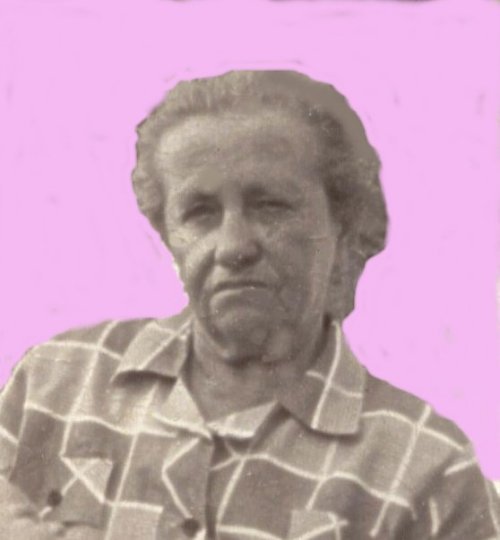
It
was a bright sunny Sunday morning and the taxi driver, Sergi, was scheduled
to meet us in front of  the
Langer Hotel at ten in the morning. We
sat on the front porch chatting with a couple of graduate students who were
on holiday. Sergie was about fifteen
minutes late when he arrived in his red Alfa Romero. As he approached I could
sense an odor emanating from his direction.
He had obviously consumed a few glasses of the local brew made from the
abundant grapes, although he was by no means intoxicated.
The hostess at the hotel standing on the porch shouted at him and scolded
him in Russian for being late. Sergi
just hung his head and didnít speak.
the
Langer Hotel at ten in the morning. We
sat on the front porch chatting with a couple of graduate students who were
on holiday. Sergie was about fifteen
minutes late when he arrived in his red Alfa Romero. As he approached I could
sense an odor emanating from his direction.
He had obviously consumed a few glasses of the local brew made from the
abundant grapes, although he was by no means intoxicated.
The hostess at the hotel standing on the porch shouted at him and scolded
him in Russian for being late. Sergi
just hung his head and didnít speak.
On the way to Janosi, there were dozens of bicycles on the road and it appeared
that this was their primary mode of transportation.
The older generation under the Communist rule has so deprived 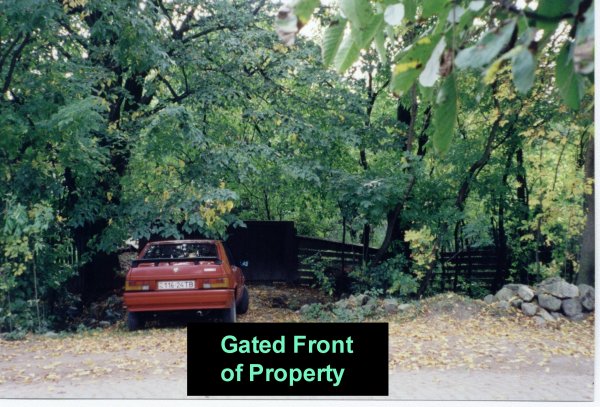 them
of their God-given right to think for themselves that they have lost their drive
and ambition and didnít
seem to care about getting ahead anymore.
Under the Communist rule the thinking was done for them.
If they didnít own cars, it was because they didnít deserve them.
The younger ones try to emigrate but are unsuccessful.
The graduate students we talked to at the hotel expressed a strong desire
to leave their country as soon as possible so they could make a decent living.
But they sadly admit that they have very little hope of getting out of
there.
them
of their God-given right to think for themselves that they have lost their drive
and ambition and didnít
seem to care about getting ahead anymore.
Under the Communist rule the thinking was done for them.
If they didnít own cars, it was because they didnít deserve them.
The younger ones try to emigrate but are unsuccessful.
The graduate students we talked to at the hotel expressed a strong desire
to leave their country as soon as possible so they could make a decent living.
But they sadly admit that they have very little hope of getting out of
there.
Sergi,
our guide (driver) couldnít speak English or Hungarian.
He was a former captain in the Russian Army and was now retired.
Larraine sat in the front seat of the car while we were driving and kept
bombarding him with talk all the while as he just kept nodding his head in polite
agreement. I sat in the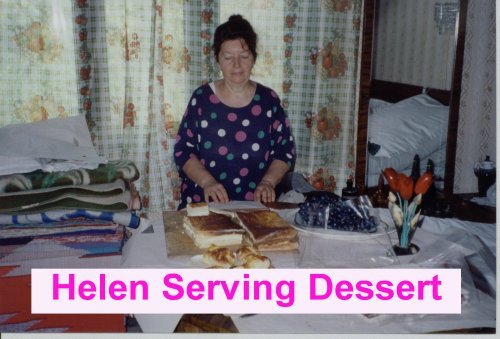 back enjoying the comedy act. I handed Sergi an envelope with a return address
of my ancestral home.
He was able to find Janosi but could not find the street (Church Street)
since it was written in Hungarian. Finally
Larraine drew a picture of a church and from that he found it.
Turning into the street a lady was sweeping the leaves on the side and
as we drove past Larraine shouted, ďItís Ilona (Helen).Ē She had recognized
her from the many pictures she had sent us during the past few years.
Ilona was my first cousinís wife.
back enjoying the comedy act. I handed Sergi an envelope with a return address
of my ancestral home.
He was able to find Janosi but could not find the street (Church Street)
since it was written in Hungarian. Finally
Larraine drew a picture of a church and from that he found it.
Turning into the street a lady was sweeping the leaves on the side and
as we drove past Larraine shouted, ďItís Ilona (Helen).Ē She had recognized
her from the many pictures she had sent us during the past few years.
Ilona was my first cousinís wife.
Their
property had a large gate in front. Dogs
were barking a chorus of cacophony and she asked us to wait while they were
put in their doghouses. Of course,
I could only speak a little Hungarian (thank God) just enough to get around.
Elmer, my first cousin, and their two children were also there to greet
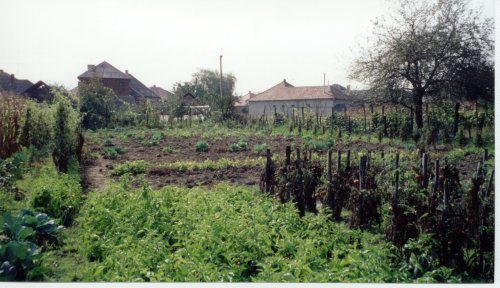 us.
After the preliminary introductions they showed us the little house where
my mother was born in 1885. They
said that half of the house was torn down in order to build a newer one along
side. Bricks were taken from the
old house to build the new one.
Rest room facilities were still the ubiquitous out house.
Inside, the gated property looked like a throw-back into the last century.
Most of the buildings were old and unpainted and in need of repair or
replacement. In the newer house there was a small dining room then a living
room with two couch beds for the two sons and a storage room for all the vegetables
that Ilona preserves. There was
also a bedroom for her and Elmer. The old house was still used for a kitchen
and sewing room. The porch had
a clothesline with some wash hanging there to dry.
us.
After the preliminary introductions they showed us the little house where
my mother was born in 1885. They
said that half of the house was torn down in order to build a newer one along
side. Bricks were taken from the
old house to build the new one.
Rest room facilities were still the ubiquitous out house.
Inside, the gated property looked like a throw-back into the last century.
Most of the buildings were old and unpainted and in need of repair or
replacement. In the newer house there was a small dining room then a living
room with two couch beds for the two sons and a storage room for all the vegetables
that Ilona preserves. There was
also a bedroom for her and Elmer. The old house was still used for a kitchen
and sewing room. The porch had
a clothesline with some wash hanging there to dry.
They
had about two acres of prime farmland on which they raised the largest vegetables
I ever saw. Their vegetable garden
was filled with every vegetable imaginable. They are very dependent on the garden
for their livelihood. They also had three goats and a lot of chickens in a coop.
There were stacks of wood stored for the 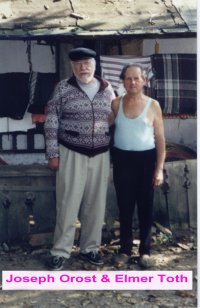 coming winter. There was an enormous
walnut tree and the walnuts were falling down on our heads. Elmer
and I posed in front of the ancestral home and Larraine took our picture.
I noticed that I was taller than most people there.
Whether that was a trait remained to be seen.
coming winter. There was an enormous
walnut tree and the walnuts were falling down on our heads. Elmer
and I posed in front of the ancestral home and Larraine took our picture.
I noticed that I was taller than most people there.
Whether that was a trait remained to be seen.
Bottles
and bottles of wine, soda and carbonated water lined the table. A
typical Hungarian dinner was prepared for us.
There was so much delicious food and drinks that we could not have possibly
eaten even part of it. Elmer had
poured champagne for all and we were given a toast. Sergi joined us for dinner
and luckily Elmer and Ilona spoke Russian.
At least they could converse. With
the little Hungarian I knew and a lot of hand waving I also was
able to join in.
Even
though the place was like a Utopia the people there were not able to live off
the land entirely so some them had to emigrate or face slow starvation.
It must have taken a lot of courage to choose to leave and come to this
country with all of the unknowns one had to face especially for my mother who
was about a 16 year old girl. Undaunted
she made the trip alone, giving up her birthplace, her language and with the
courage of knowing she would never lay eyes on her family again.
After earning enough money she brought her sister, Pearl,
over to this country. It
didnít take Pearl long to take a dislike for her new home and the terrible working
conditions which prevailed at the time.
After earning her fare she
returned. The United States was just too much for her. In this country, most
of them worked in factories in 1901 as indigent-slave labor in order to exist.
My mother wanted to return 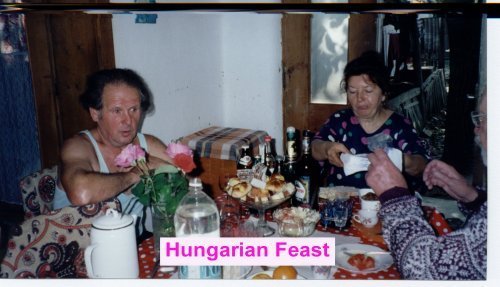 too
but her voyage across the Atlantic Ocean was
so disastrous that it kept
her from returning. She was seasick
most of the way over and she could not face a repeat performance.
too
but her voyage across the Atlantic Ocean was
so disastrous that it kept
her from returning. She was seasick
most of the way over and she could not face a repeat performance.
I
was told that during the Communist Era after World War II the Russians rounded
up all of the young men and older boys and loaded them into boxcars never to
be seen again. But they still
cling to the land so much so that they were willing to face the extreme cruelties
perpetrated by the Communists. Were
it not for the courage of my 16-year old mother to emigrate, I could have been
one of the young men humiliated, dragged and shoved into
the odoriferous boxcars like so
many cattle perhaps to serve as slave labor in the salt mines or drafted into
their army. Would I now be part
of the zombie generation whose mind had been altered to obey and not think for
fear of reprisal? Would I be one
who had lost hope to aspire for happiness and a better life.
Would I never have reason to smile again?
One of the stark realities in this land is the hopelessness of people
who no longer possess the ability to
laugh or smile.
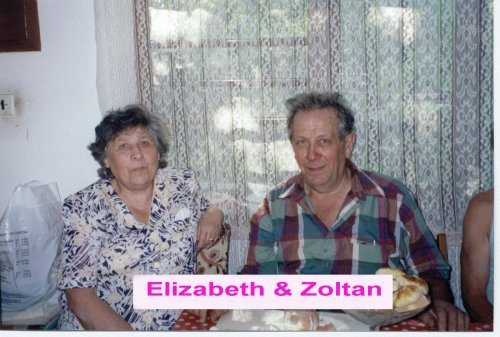
After
much conversation most of which clarified how we were all related and the viewing
of many old photographs we took our leave of Janosi taking back the many pleasant
memories crammed into the few hours of visitation.
